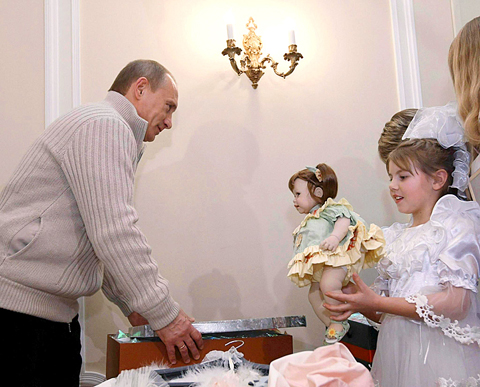Russian Prime Minister Vladimir Putin has set Russia on a collision course with western Europe after he warned that the era of cheap gas is over even as oil prices continue to slump.
Russia’s prime minister was speaking as he hosted a meeting of a dozen gas-producing countries on Tuesday in Moscow to set up an OPEC-like production cartel.
“Costs of exploration, gas production and transportation are going up,” he said. “It means the industry’s development costs will skyrocket. The time of cheap energy resources, cheap gas is surely coming to an end.”

PHOTO: EPA
Analysts said that in the short term, energy markets do not reflect his comments. Gas prices are index-linked to the price of oil, typically with a time lag of about six months. Oil has slumped from an all-time high of US$147 a barrel this summer to barely above US$40 this week. Adam Sieminski, chief energy economist at Deutsche Bank, said that natural gas prices should fall sharply in the next six months.
If Russia tried to keep the price it charges European consumers for gas artificially high next year, he said, it would encourage countries to seek other sources of energy, such as nuclear power, over the longer term.
Russia supplies a quarter of Europe’s gas. Other countries in the Gas Exporting Countries Forum include Algeria, Iran and Venezuela.
Russia has already flexed its muscles on energy this week. The state-owned gas monopoly Gazprom warned that supplies to Europe could be disrupted this winter because of a long-running row with Ukraine — through which most of the gas exported to Europe passes — over prices.
But Russia has resisted pressure from OPEC to cut its oil production. This week the cartel agreed to reduce output by a further 2.2 million barrels a day — its largest single cut — but the oil price continued to fall.

MORE VISITORS: The Tourism Administration said that it is seeing positive prospects in its efforts to expand the tourism market in North America and Europe Taiwan has been ranked as the cheapest place in the world to travel to this year, based on a list recommended by NerdWallet. The San Francisco-based personal finance company said that Taiwan topped the list of 16 nations it chose for budget travelers because US tourists do not need visas and travelers can easily have a good meal for less than US$10. A bus ride in Taipei costs just under US$0.50, while subway rides start at US$0.60, the firm said, adding that public transportation in Taiwan is easy to navigate. The firm also called Taiwan a “food lover’s paradise,” citing inexpensive breakfast stalls

TRADE: A mandatory declaration of origin for manufactured goods bound for the US is to take effect on May 7 to block China from exploiting Taiwan’s trade channels All products manufactured in Taiwan and exported to the US must include a signed declaration of origin starting on May 7, the Bureau of Foreign Trade announced yesterday. US President Donald Trump on April 2 imposed a 32 percent tariff on imports from Taiwan, but one week later announced a 90-day pause on its implementation. However, a universal 10 percent tariff was immediately applied to most imports from around the world. On April 12, the Trump administration further exempted computers, smartphones and semiconductors from the new tariffs. In response, President William Lai’s (賴清德) administration has introduced a series of countermeasures to support affected

CROSS-STRAIT: The vast majority of Taiwanese support maintaining the ‘status quo,’ while concern is rising about Beijing’s influence operations More than eight out of 10 Taiwanese reject Beijing’s “one country, two systems” framework for cross-strait relations, according to a survey released by the Mainland Affairs Council (MAC) on Thursday. The MAC’s latest quarterly survey found that 84.4 percent of respondents opposed Beijing’s “one country, two systems” formula for handling cross-strait relations — a figure consistent with past polling. Over the past three years, opposition to the framework has remained high, ranging from a low of 83.6 percent in April 2023 to a peak of 89.6 percent in April last year. In the most recent poll, 82.5 percent also rejected China’s

PLUGGING HOLES: The amendments would bring the legislation in line with systems found in other countries such as Japan and the US, Legislator Chen Kuan-ting said Democratic Progressive Party (DPP) Legislator Chen Kuan-ting (陳冠廷) has proposed amending national security legislation amid a spate of espionage cases. Potential gaps in security vetting procedures for personnel with access to sensitive information prompted him to propose the amendments, which would introduce changes to Article 14 of the Classified National Security Information Protection Act (國家機密保護法), Chen said yesterday. The proposal, which aims to enhance interagency vetting procedures and reduce the risk of classified information leaks, would establish a comprehensive security clearance system in Taiwan, he said. The amendment would require character and loyalty checks for civil servants and intelligence personnel prior to